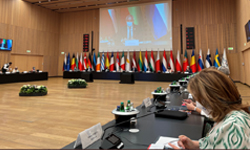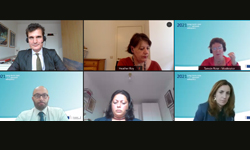BusinessEurope Headlines No. 2021-24
Business calling for the right balance on future corporate governance and due diligence rules

Business is in favour of actions to support and encourage companies in the transition towards more sustainability. However, at the end of the road, it is essential that all these initiatives (from taxonomy to corporate governance) fit together, do not overlap, take account of the needs of the real economy and do not place European companies under unsustainable expectations and obligations. On due diligence, the aim should be for a framework that is proportionate and workable; that will not simply force companies from disengaging from other markets. The future corporate governance rules should not harm companies’ ability to do business effectively nor weaken current corporate governance models by blurring directors’ duties. These messages were voiced by the President of BusinessEurope, Pierre Gattaz, during an exchange between European Commissioner for Justice Didier Reynders and several Presidents and Directors General of BusinessEurope member federations, on 8 July.
Contact: Pedro Oliveira
New Publication: Economic Outlook
EU recovery underway, but spread of new COVID variants remains clear risk
 “The EU economy is picking up strongly, but the path back towards a full recovery after the COVID-19 induced recession will be long and fraught with downside risks, including from inflationary pressures and the spread of new more transmissible virus variants”, said BusinessEurope Director General Markus J. Beyrer at the release of our Summer 2021 Economic Outlook on 12 July. He highlighted it is essential to avoid any premature unwinding of supportive measures to businesses and workers at this juncture. In the medium term, EU Member States must return to fiscally sustainable positions, reflecting the situation in the aftermath of the COVID-19 pandemic.
“The EU economy is picking up strongly, but the path back towards a full recovery after the COVID-19 induced recession will be long and fraught with downside risks, including from inflationary pressures and the spread of new more transmissible virus variants”, said BusinessEurope Director General Markus J. Beyrer at the release of our Summer 2021 Economic Outlook on 12 July. He highlighted it is essential to avoid any premature unwinding of supportive measures to businesses and workers at this juncture. In the medium term, EU Member States must return to fiscally sustainable positions, reflecting the situation in the aftermath of the COVID-19 pandemic.
The outlook notes that EU exports have bounced back strongly with our larger trading partners recuperating faster than Europe, and the roll-out of vaccines has recently allowed EU governments to begin reopening our economies, meaning we can finally begin to see a way forward back towards pre-crisis levels of economic activity.
Reflecting these developments, BusinessEurope forecasts economic growth in the EU27 of 4.4% this year, followed by 4.6% next year. Read our full forecast and policy recommendations.
![]() Contact: Malthe Munkøe
Contact: Malthe Munkøe
Making trade more sustainable must be a global effort
 “Making trade more sustainable should go hand-in-hand with efforts to transition to a more sustainable global economy. It should be a global effort that needs to be carefully balanced to ensure Europe’s competitiveness and presence in global markets is not jeopardised”, said Luisa Santos, Deputy Director General of BusinessEurope at the webinar “How sustainable can trade be?”. The event was hosted by MEP Saskia Bricmont, from the Greens/EFA group in the European Parliament on 14 July. To make sustainable trade a success, Santos added, we should work on parallel tracks including by (a) promoting further trade liberalisation for sustainable goods and services; (b) modernising multilateral trading rules in key areas like industrial subsidies; (c) better using unilateral preference schemes to support the uptake of sustainable development objectives; (d) ensuring more transparent and sustainable public procurement, especially in key projects, for instance in the area of connectivity; (e) and increasing consumer awareness.
“Making trade more sustainable should go hand-in-hand with efforts to transition to a more sustainable global economy. It should be a global effort that needs to be carefully balanced to ensure Europe’s competitiveness and presence in global markets is not jeopardised”, said Luisa Santos, Deputy Director General of BusinessEurope at the webinar “How sustainable can trade be?”. The event was hosted by MEP Saskia Bricmont, from the Greens/EFA group in the European Parliament on 14 July. To make sustainable trade a success, Santos added, we should work on parallel tracks including by (a) promoting further trade liberalisation for sustainable goods and services; (b) modernising multilateral trading rules in key areas like industrial subsidies; (c) better using unilateral preference schemes to support the uptake of sustainable development objectives; (d) ensuring more transparent and sustainable public procurement, especially in key projects, for instance in the area of connectivity; (e) and increasing consumer awareness.
Contact: Luisa Santos
Towards a wellbeing economy
 The COVID crisis has underlined the crucial role of a vibrant private sector in delivering good and services essential to our wellbeing. This was the key message of BusinessEurope's Economics Director, James Watson, at a discussion at the European Economic Social Committee Plenary meeting entitle, “A post-COVID economy that works for all - Towards a well-being economy”, on 7 July. Drawing on the joint work on supplementing GDP as a welfare measure undertaken by social partners ahead of the Porto Social Summit in May this year, James noted that GDP is an important determinant of long-term prosperity, but needs to be supplemented by other economic, social and environmental indicators.
The COVID crisis has underlined the crucial role of a vibrant private sector in delivering good and services essential to our wellbeing. This was the key message of BusinessEurope's Economics Director, James Watson, at a discussion at the European Economic Social Committee Plenary meeting entitle, “A post-COVID economy that works for all - Towards a well-being economy”, on 7 July. Drawing on the joint work on supplementing GDP as a welfare measure undertaken by social partners ahead of the Porto Social Summit in May this year, James noted that GDP is an important determinant of long-term prosperity, but needs to be supplemented by other economic, social and environmental indicators.
![]() Contact: James Watson
Contact: James Watson
EPSCO Council has a key role to increase employment, productivity, growth and competitiveness
 Recovery and resilience plans are a unique opportunity for the European semester to achieve better results towards gradual economic and social convergence among EU Member States. The Employment, Social Policy, Health and Consumer Affairs Council (EPSCO), notably through its benchlearning activities, has a key role to support Member States, in particular those lagging behind, to encourage them to reform their labour markets and social systems. Available resources at EU and national level need to be channelled in priority into productive social investment. Social policy should be combined with solid economic and cohesion policies to increase employment, productivity, growth and competitiveness for the benefit of all Europeans. This will help companies and workers succeed in the digital and green transitions, while being better prepared to face the consequences of demographic ageing. These were the key messages by Maxime Cerutti, Social Affairs Director, at the informal EPSCO meeting that was held in Brdo in Slovenia on 8-9 July 2021.
Recovery and resilience plans are a unique opportunity for the European semester to achieve better results towards gradual economic and social convergence among EU Member States. The Employment, Social Policy, Health and Consumer Affairs Council (EPSCO), notably through its benchlearning activities, has a key role to support Member States, in particular those lagging behind, to encourage them to reform their labour markets and social systems. Available resources at EU and national level need to be channelled in priority into productive social investment. Social policy should be combined with solid economic and cohesion policies to increase employment, productivity, growth and competitiveness for the benefit of all Europeans. This will help companies and workers succeed in the digital and green transitions, while being better prepared to face the consequences of demographic ageing. These were the key messages by Maxime Cerutti, Social Affairs Director, at the informal EPSCO meeting that was held in Brdo in Slovenia on 8-9 July 2021.
Contact: Maxime Cerutti
Main factors for coping with the social consequences of ageing
 According to Eurostat’s projections, the number of people aged 65 years or more will reach 129.8 million by 2050 in the EU, an expected increase of 43.4%, from 90.5 million in 2019. The trend to higher levels of dependency in our societies is clear. The need for investments in care infrastructures will increase. But Europe’s capacity to do so should not be overestimated, as we will need in parallel to return to strong public finances. In reality, employment, productivity and financially viable pensions systems are the main factors of success to face the social consequences of ageing. With a shrinking working age population, more people will need to work, in particular women. Productivity gains, notably through improved skills training, will also play a key role in sustaining our social protection systems in the future. A new advisory committee on social protection is necessary at EU level to support regular policy coordination and mutual learning between Member States and social partners across Europe. These were the key messages of Maxime Cerutti, Social Affairs Director, during the European Commission’s online event on long-term care and pensions adequacy on 12 July.
According to Eurostat’s projections, the number of people aged 65 years or more will reach 129.8 million by 2050 in the EU, an expected increase of 43.4%, from 90.5 million in 2019. The trend to higher levels of dependency in our societies is clear. The need for investments in care infrastructures will increase. But Europe’s capacity to do so should not be overestimated, as we will need in parallel to return to strong public finances. In reality, employment, productivity and financially viable pensions systems are the main factors of success to face the social consequences of ageing. With a shrinking working age population, more people will need to work, in particular women. Productivity gains, notably through improved skills training, will also play a key role in sustaining our social protection systems in the future. A new advisory committee on social protection is necessary at EU level to support regular policy coordination and mutual learning between Member States and social partners across Europe. These were the key messages of Maxime Cerutti, Social Affairs Director, during the European Commission’s online event on long-term care and pensions adequacy on 12 July.
Contact: Anna Kwiatkiewicz-Mory
How to address skills mismatches on both sides of the Mediterranean
 Employers have already reported skills mismatches before the COVID crisis. Digitalisation, demographic change and greening of economies are additional drivers that make upskilling and re-skilling urgently needed. A special attention should be paid to digital skills for which demand has increased during the pandemic and which are the condition for green transition. Social partners’ driven approach is the most effective to address current skills challenges. Sectoral social partners are very well placed to foster a diversified offer of training options that fits with employers’ and workers’ needs on the labour market. There is also a good potential in addressing skills challenges through dialogue between the EU and third countries. Such cooperation could focus on improving the matching of the third country nationals with job vacancies in the EU, developing means to better understand their qualifications and improving their correspondence with the European Qualifications Framework. These were the main messages of BusinessEurope Adviser for Social Affairs Anna Kwiatkiewicz-Mory during the Union for the Mediterranean (UfM) Regional Dialogue with social partners: enhancing skills for better employability, that took place on 8 July with participation of the UfM Secretariat, the European Commission, European Training Foundation, the International Labour Organisation and social partners from both sides of the Mediterranean.
Employers have already reported skills mismatches before the COVID crisis. Digitalisation, demographic change and greening of economies are additional drivers that make upskilling and re-skilling urgently needed. A special attention should be paid to digital skills for which demand has increased during the pandemic and which are the condition for green transition. Social partners’ driven approach is the most effective to address current skills challenges. Sectoral social partners are very well placed to foster a diversified offer of training options that fits with employers’ and workers’ needs on the labour market. There is also a good potential in addressing skills challenges through dialogue between the EU and third countries. Such cooperation could focus on improving the matching of the third country nationals with job vacancies in the EU, developing means to better understand their qualifications and improving their correspondence with the European Qualifications Framework. These were the main messages of BusinessEurope Adviser for Social Affairs Anna Kwiatkiewicz-Mory during the Union for the Mediterranean (UfM) Regional Dialogue with social partners: enhancing skills for better employability, that took place on 8 July with participation of the UfM Secretariat, the European Commission, European Training Foundation, the International Labour Organisation and social partners from both sides of the Mediterranean.
Contact: Robert Plummer
Risks of an EU digital levy: letter to President von der Leyen
 Ahead of the G20 Finance Ministers meeting of 9-10 July, BusinessEurope sent a letter to President of the European Commission Ursula von der Leyen, setting out its concerns on the Commission’s upcoming proposal for an EU digital levy. The letter argues that when presenting this proposal, the European Commission should set out in full the risks of such a unilateral measure to both breaking the spirit of the G7 agreement regarding the removal of unilateral digital taxes and the potential damage to the digitalisation of the EU economy. In particular, it is noted that such a levy could damage relations with our major trading partner, the USA – where concerns have already been raised about the EU’s digital levy – with the potential for on-going tariff retaliation, and endanger future prospects for the swift agreement and implementation of a global deal in both the USA and other countries. In addition, adopting a unilateral EU digital levy could hamper the development of the EU’s broader digital transition and hence our overall competitiveness.
Ahead of the G20 Finance Ministers meeting of 9-10 July, BusinessEurope sent a letter to President of the European Commission Ursula von der Leyen, setting out its concerns on the Commission’s upcoming proposal for an EU digital levy. The letter argues that when presenting this proposal, the European Commission should set out in full the risks of such a unilateral measure to both breaking the spirit of the G7 agreement regarding the removal of unilateral digital taxes and the potential damage to the digitalisation of the EU economy. In particular, it is noted that such a levy could damage relations with our major trading partner, the USA – where concerns have already been raised about the EU’s digital levy – with the potential for on-going tariff retaliation, and endanger future prospects for the swift agreement and implementation of a global deal in both the USA and other countries. In addition, adopting a unilateral EU digital levy could hamper the development of the EU’s broader digital transition and hence our overall competitiveness.
![]() Contact: Pieter Baert
Contact: Pieter Baert
Calendar 
- 18 August-3 September: European Forum Alpbach 2021
- 9 September: Headlines is back!
- 19-22 September: XXII World Congress on Safety and Health at Work
Not yet a subscriber? Register here.
Reminder: please have a look at our privacy policy